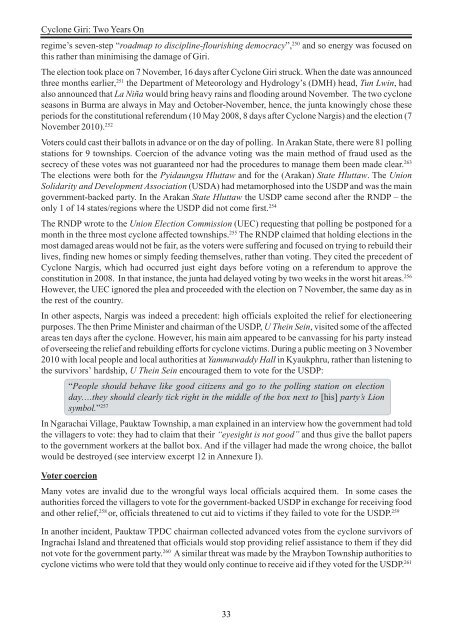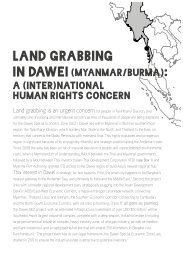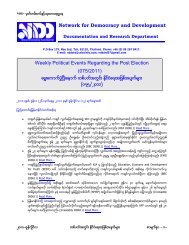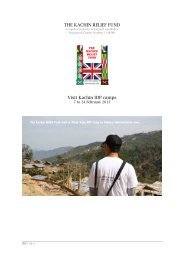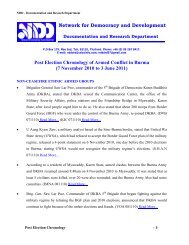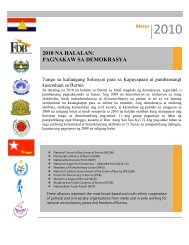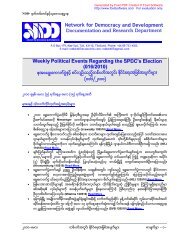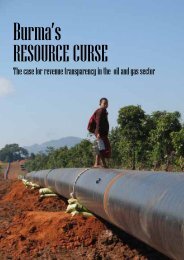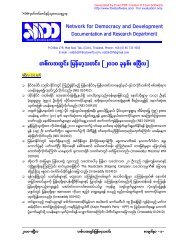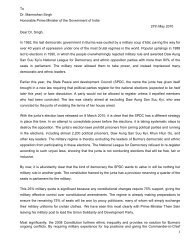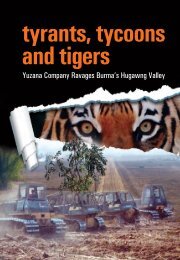Cyclone Giri - Two Years On - Burma Action Ireland
Cyclone Giri - Two Years On - Burma Action Ireland
Cyclone Giri - Two Years On - Burma Action Ireland
You also want an ePaper? Increase the reach of your titles
YUMPU automatically turns print PDFs into web optimized ePapers that Google loves.
<strong>Cyclone</strong> <strong>Giri</strong>: <strong>Two</strong> <strong>Years</strong> <strong>On</strong><br />
regime’s seven-step “roadmap to discipline-flourishing democracy”, 250 and so energy was focused on<br />
this rather than minimising the damage of <strong>Giri</strong>.<br />
The election took place on 7 November, 16 days after <strong>Cyclone</strong> <strong>Giri</strong> struck. When the date was announced<br />
three months earlier, 251 the Department of Meteorology and Hydrology’s (DMH) head, Tun Lwin, had<br />
also announced that La Niña would bring heavy rains and flooding around November. The two cyclone<br />
seasons in <strong>Burma</strong> are always in May and October-November, hence, the junta knowingly chose these<br />
periods for the constitutional referendum (10 May 2008, 8 days after <strong>Cyclone</strong> Nargis) and the election (7<br />
November 2010). 252<br />
Voters could cast their ballots in advance or on the day of polling. In Arakan State, there were 81 polling<br />
stations for 9 townships. Coercion of the advance voting was the main method of fraud used as the<br />
secrecy of these votes was not guaranteed nor had the procedures to manage them been made clear. 263<br />
The elections were both for the Pyidaungsu Hluttaw and for the (Arakan) State Hluttaw. The Union<br />
Solidarity and Development Association (USDA) had metamorphosed into the USDP and was the main<br />
government-backed party. In the Arakan State Hluttaw the USDP came second after the RNDP – the<br />
only 1 of 14 states/regions where the USDP did not come first. 254<br />
The RNDP wrote to the Union Election Commission (UEC) requesting that polling be postponed for a<br />
month in the three most cyclone affected townships. 255 The RNDP claimed that holding elections in the<br />
most damaged areas would not be fair, as the voters were suffering and focused on trying to rebuild their<br />
lives, finding new homes or simply feeding themselves, rather than voting. They cited the precedent of<br />
<strong>Cyclone</strong> Nargis, which had occurred just eight days before voting on a referendum to approve the<br />
constitution in 2008. In that instance, the junta had delayed voting by two weeks in the worst hit areas. 256<br />
However, the UEC ignored the plea and proceeded with the election on 7 November, the same day as in<br />
the rest of the country.<br />
In other aspects, Nargis was indeed a precedent: high officials exploited the relief for electioneering<br />
purposes. The then Prime Minister and chairman of the USDP, U Thein Sein, visited some of the affected<br />
areas ten days after the cyclone. However, his main aim appeared to be canvassing for his party instead<br />
of overseeing the relief and rebuilding efforts for cyclone victims. During a public meeting on 3 November<br />
2010 with local people and local authorities at Yammawaddy Hall in Kyaukphru, rather than listening to<br />
the survivors’ hardship, U Thein Sein encouraged them to vote for the USDP:<br />
“People should behave like good citizens and go to the polling station on election<br />
day….they should clearly tick right in the middle of the box next to [his] party’s Lion<br />
symbol.” 257<br />
In Ngarachai Village, Pauktaw Township, a man explained in an interview how the government had told<br />
the villagers to vote: they had to claim that their “eyesight is not good” and thus give the ballot papers<br />
to the government workers at the ballot box. And if the villager had made the wrong choice, the ballot<br />
would be destroyed (see interview excerpt 12 in Annexure I).<br />
Voter coercion<br />
Many votes are invalid due to the wrongful ways local officials acquired them. In some cases the<br />
authorities forced the villagers to vote for the government-backed USDP in exchange for receiving food<br />
and other relief, 258 or, officials threatened to cut aid to victims if they failed to vote for the USDP. 259<br />
In another incident, Pauktaw TPDC chairman collected advanced votes from the cyclone survivors of<br />
Ingrachai Island and threatened that officials would stop providing relief assistance to them if they did<br />
not vote for the government party. 260 A similar threat was made by the Mraybon Township authorities to<br />
cyclone victims who were told that they would only continue to receive aid if they voted for the USDP. 261<br />
33


